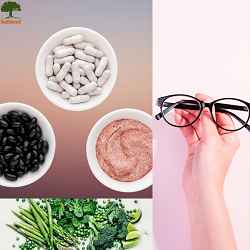Zeaxanthin
What is Zeaxanthin?
 The root terms “zea” and “xanthos” are combined to form the name “zeaxanthin.” Corn belongs to the taxonomic genus Zea, which is named after the Greek word for grain. The Greek term zanthos means “yellow,” referring to the colour of zeaxanthin. Zeaxanthin is a carotenoid alcohol that occurs naturally. It is an integral component of the xanthophyll cycle, which is crucial for photosynthesizing plants. Plants create the majority of zeaxanthin, however some microorganisms also make it.
The root terms “zea” and “xanthos” are combined to form the name “zeaxanthin.” Corn belongs to the taxonomic genus Zea, which is named after the Greek word for grain. The Greek term zanthos means “yellow,” referring to the colour of zeaxanthin. Zeaxanthin is a carotenoid alcohol that occurs naturally. It is an integral component of the xanthophyll cycle, which is crucial for photosynthesizing plants. Plants create the majority of zeaxanthin, however some microorganisms also make it.
Why should you care?
It’s high in antioxidants and has been linked to a variety of health advantages, including lowering the risk of age-related macular degeneration, glaucoma, and cataracts. The main benefit of taking zeaxanthin as a health supplement is to help with eye health. The principal component of the central macula, which is a pigmented area at the centre of the retina in human eyes, is zeaxanthin.
How is zeaxanthin beneficial for your eyes?
Many scientific investigations have found that zeaxanthin is critical for maintaining proper eye function, particularly in the context of age-related disorders.
for maintaining proper eye function, particularly in the context of age-related disorders.
- Zeaxanthin decreases oxidative stress and damage in the eye by absorbing blue light, which reduces inflammation and the risk of eye illness, according to research.
- It has been linked to a reduced risk of age-related eye illness, such as AMD, cataracts, and glaucoma. The macula of the eye, which is important for fine-feature vision, is destroyed by certain eye disorders. The antioxidant properties of zeaxanthin aid to avoid oxidative stress, reduce eye inflammation, and protect the macula from damage.
- Zeaxanthin is also vital for eye growth in growing foetuses and for maintaining good eyesight in young adults.
What are the other potential benefits of zeaxanthin?
- Zeaxanthin is found in areas of the brain related with cognition, movement coordination, and decision making, in addition to its role in vision. Despite this, research demonstrate that persons with Alzheimer’s disease who have higher amounts of zeaxanthin have a lower death risk.
- Human skin contains substantial levels of zeaxanthin. Zeaxanthin absorbs damaging blue light waves and protects the eyes and skin from oxidative stress caused by free radicals. Dryness or roughness, wrinkles, loss of suppleness, and discolouration are all signs of ageing skin. According to research, zeaxanthin’s UV protection may help to reduce the indications of skin ageing. People benefited from a diet high in zeaxanthin as well as using a skin lotion containing zeaxanthin and other antioxidants.
- Low xanthophyll carotenoids, such as zeaxanthin, have been linked to a higher risk of kidney disease. For those with chronic renal disease, eating zeaxanthin from egg yolks may provide antioxidant advantages.
How can you incorporate zeaxanthin in your diet naturally?
Leafy green vegetables like collard greens, kale, spinach, romaine lettuce, Swiss chard, and turnip greens are the best sources of zeaxanthin in the diet. Goji berries, broccoli, corn, kiwifruit, peas, and zucchini are other typical vegetables that are high in zeaxanthin. Other foods that contain zeaxanthin include eggs and spirulina.
What about zeaxanthin supplements?
Taking zeaxanthin supplements has been demonstrated to enhance the density of the macular pigment in your eye, which is linked to a lower risk of AMD. More research is needed, however, to discover what doses are safe and useful.
What is the ideal dosage of zeaxanthin?
There is currently no daily zeaxanthin intake recommendation. Consumption of at least 2 mg, on the other hand, appears to have some health benefits.
Should you be aware of any side effects?
Although additional research is needed to establish acceptable daily limits, zeaxanthin is generally considered safe.
What is the conclusion?
For your eyes, zeaxanthin is a crucial chemical that protects them from damage throughout your lifetime. It belongs to the carotenoid family and is fat-soluble. You can acquire it through your diet by eating a variety of healthy foods and taking supplements. What are you waiting for? Go and start your zeaxanthin-rich diet/supplement today.
